A sustainable future
Nesta’s mission is to stop UK homes from contributing to climate change

To tackle the climate emergency, the UK urgently needs to make progress on reducing carbon emissions. The impact of climate change is already being felt locally and globally. The UK faces more flooding, hotter weather, decreased biodiversity and worsening air quality.
Our work aims to make it easier for people to use clean, green sources of energy to heat and power their homes.
Households can’t do this alone. We are building partnerships with national and local governments, energy suppliers, financial institutions and others who have a key role to play in making this transition possible.
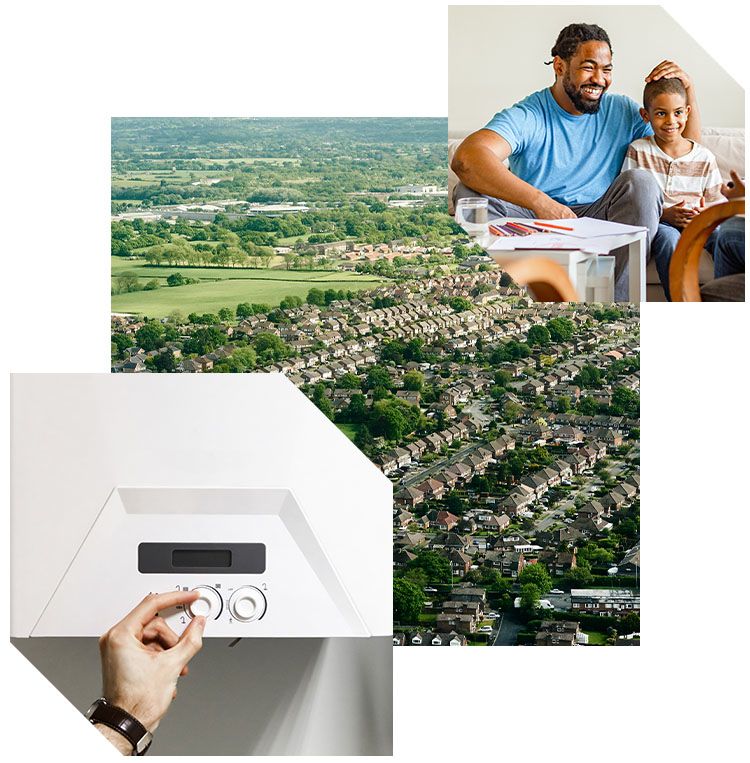
Our goal is to reduce household emissions by 30% from 2019 levels by 2030.
The residential sector is the third-largest producer of greenhouse gas emissions after transport and business. Homes are directly responsible for creating around 70 million tonnes of CO2 annually. Most of this comes from burning fossil fuels – gas and oil – for heating, hot water and cooking. Generating the electricity to power homes creates another 30 million tonnes of CO2 each year.
"Changing how we heat our homes is one of the most impactful things we can do as a country to cut pollution."
Despite a slight drop after 2005, when condensing boilers were mandated, household emissions have been stubbornly high for the last 30 years. To reach the UK’s climate targets, we’ll need to see homes cut emissions at a much faster rate.
What will it take to do this? We’ll need homes to use less energy and ensure that the energy they do use comes from low-carbon sources. Homes currently waste a lot of energy through poor insulation and inefficient heating systems, so there’s lots of scope to reduce energy use by improving efficiency. Ultimately, we need to move away from heating our homes with fossil fuels and switch to greener energy sources.
Mission Director, Madeleine Gabriel, discusses Nesta's sustainable future mission.
Electric heat pumps are a good example of a technology that helps with both these goals – they are at least three times as efficient as gas boilers and, right now, can cut emissions from heating by 60%. As electricity gets greener over time, these emissions will drop even further.
In the meantime, as society phases out CO2-emitting gas boilers, the UK’s overall electricity demand will increase. Using power more efficiently in homes now and in the future, and adapting away from peak time usage, will be crucial.

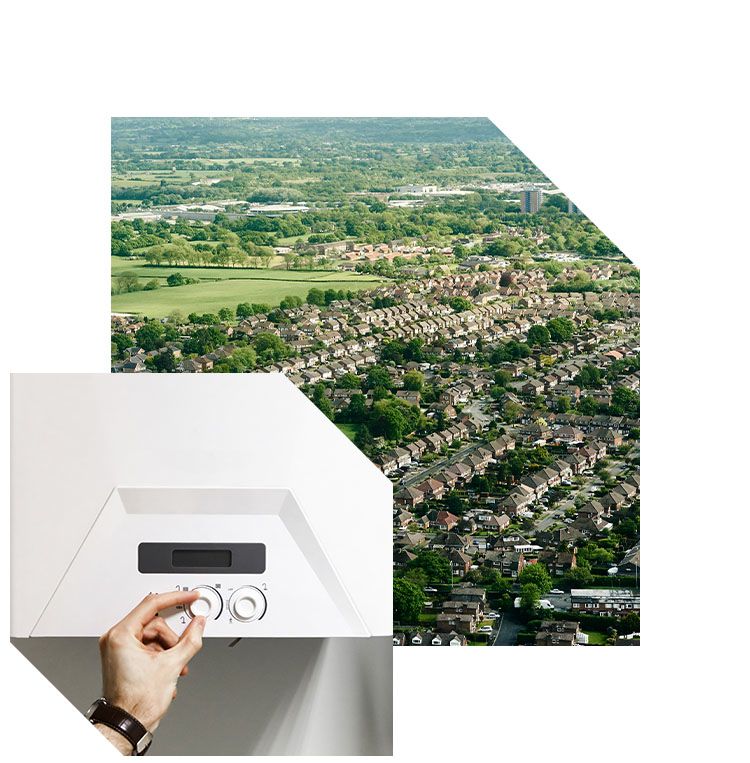

Domestic emissions since 2005 in the UK (total Co2 emissions, 000s of tonnes)
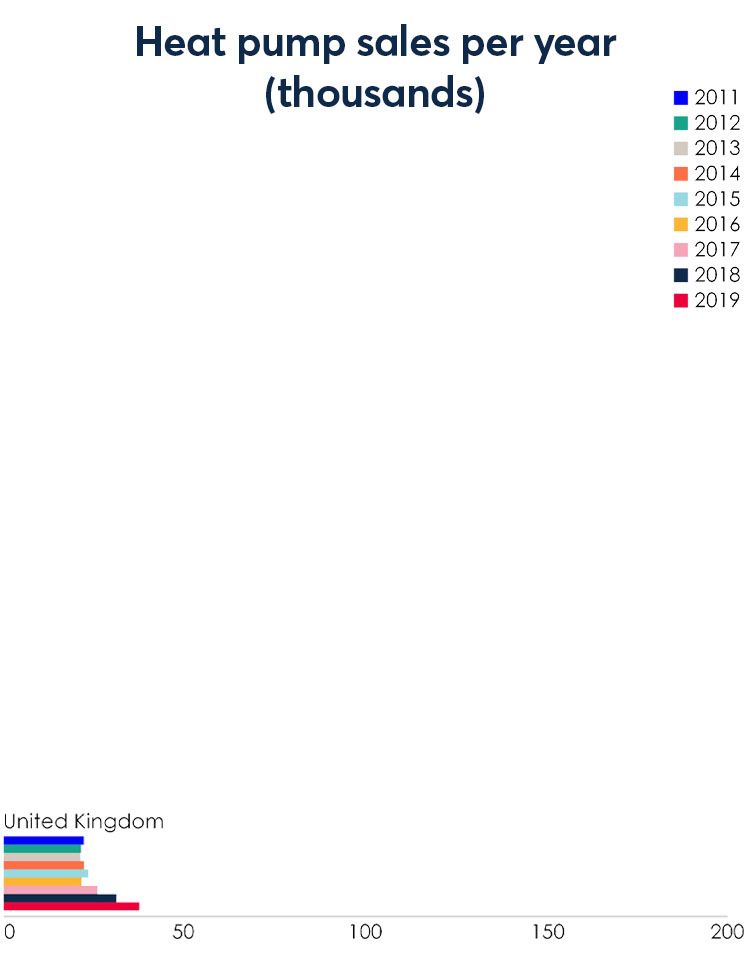
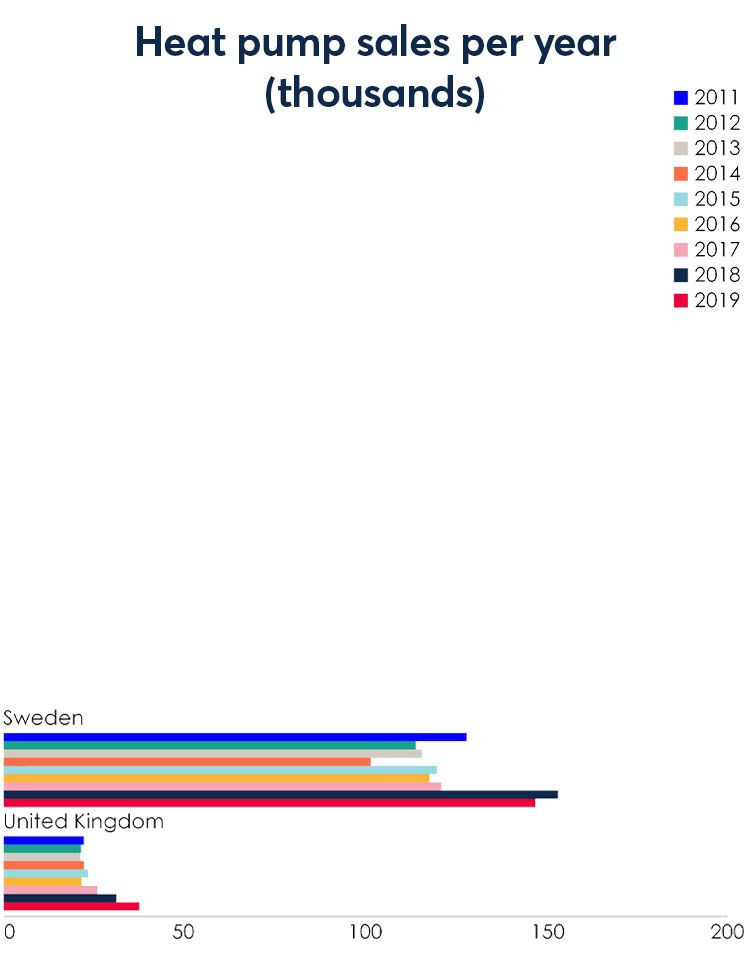
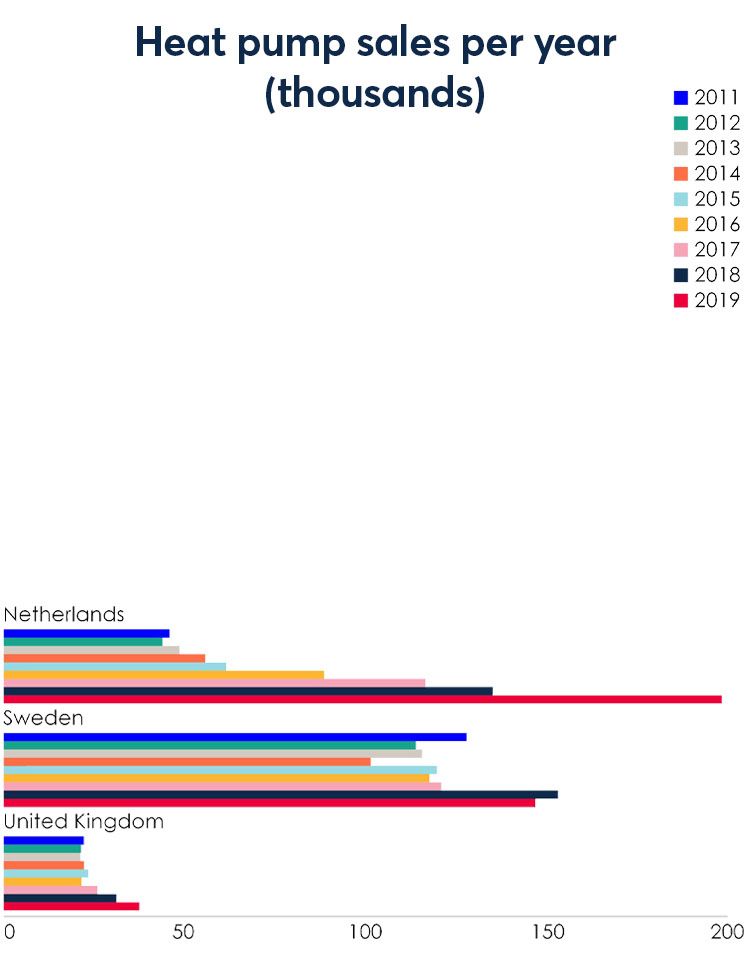
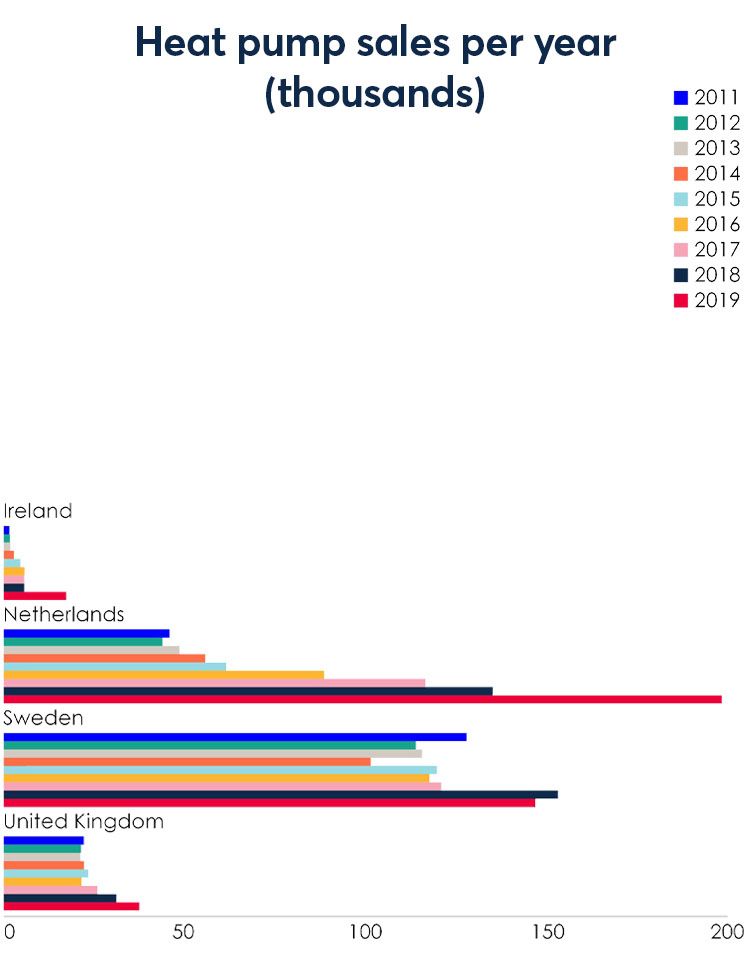
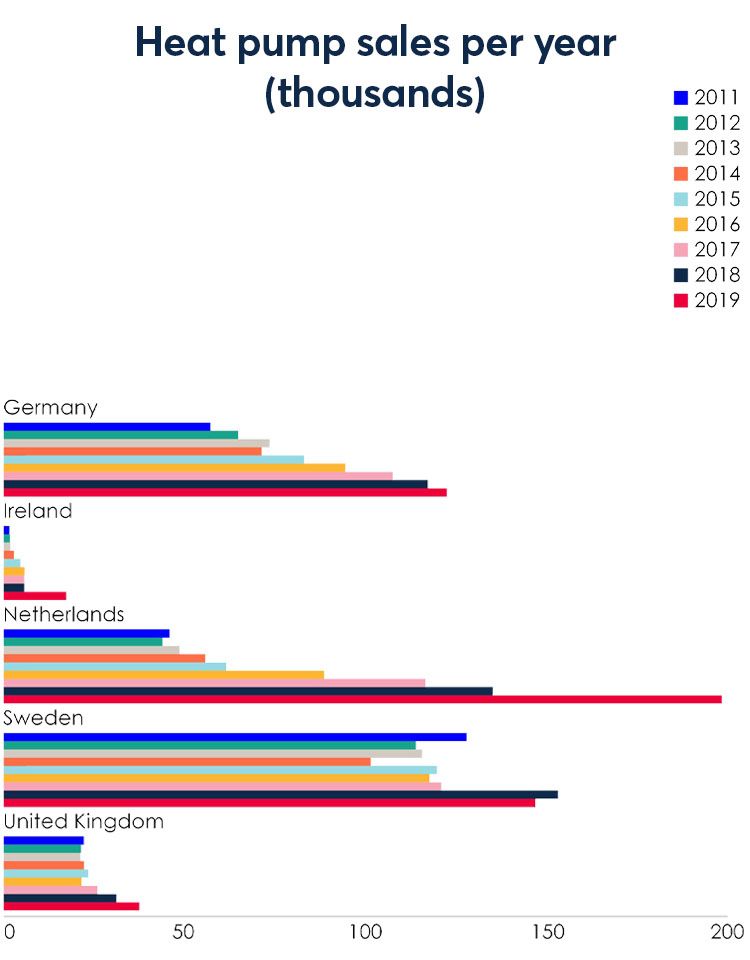
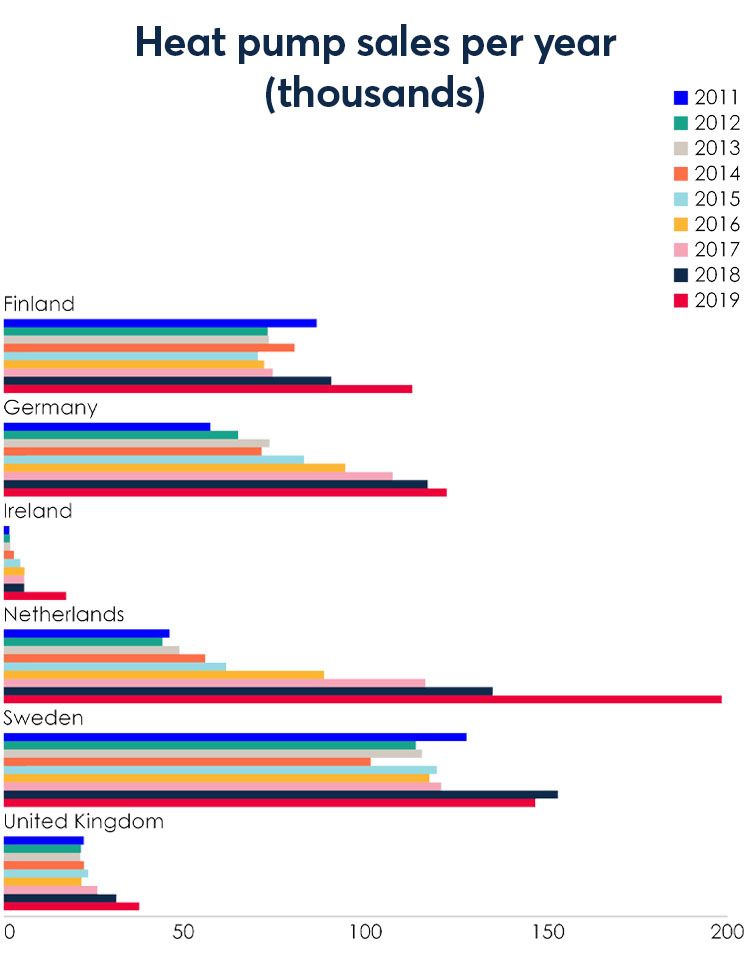
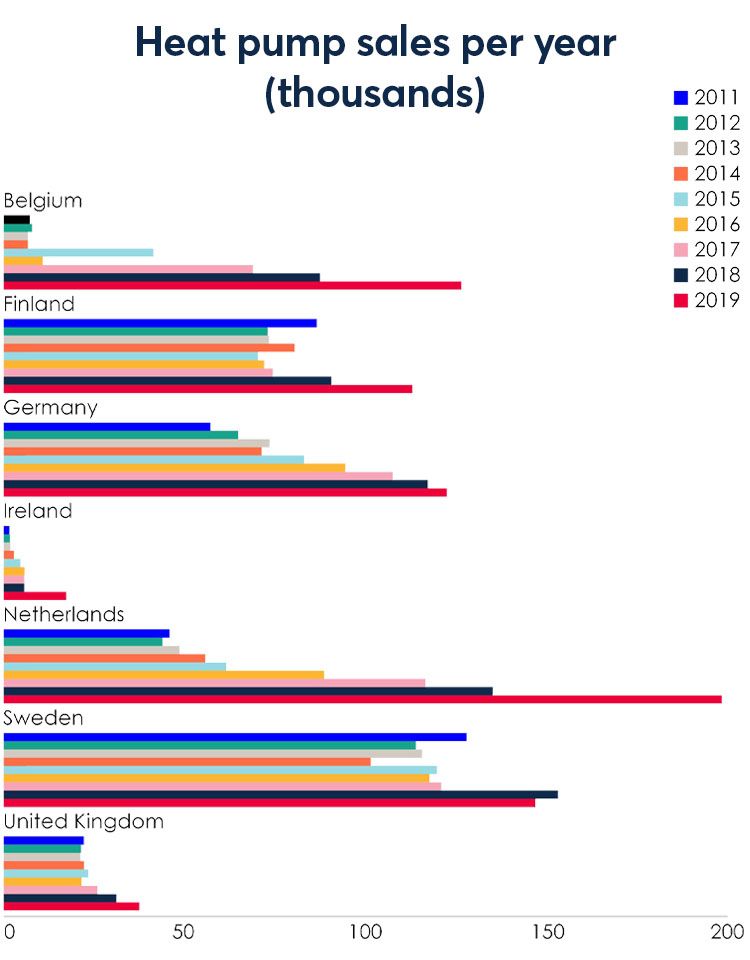
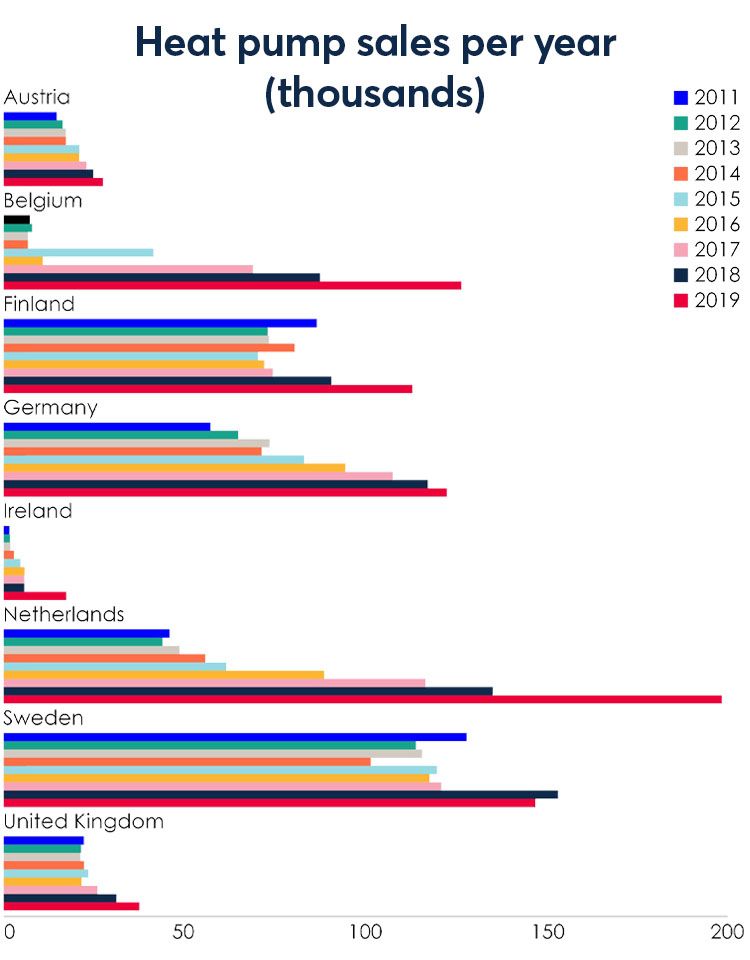
The UK has a mountain to climb to boost uptake of low-carbon heating, lagging far behind comparator countries. Heat pump sales in Finland, Germany, Sweden and Netherlands dwarf those in the UK.
Despite this, there are reasons to be positive. The UK has performed well when it comes to decarbonising electricity. Furthermore, public support for action on climate change in the UK is high.

Research conducted by the Department of Business, Energy and Industrial Strategy found 10% of all respondents said they are likely to install an air-source heat pump in the next few years. Meanwhile, our research on willingness to pay for heat pumps found that up to 25% of people may choose a heat pump over a gas boiler even at current prices. The heat pump installers we have spoken to also report full order books.
The key is to make it easy and attractive for people who want to make their homes greener to do so, while working to make green heating and home energy appealing and affordable for everyone in the medium term. This makes us optimistic that with modest cost decreases and access to finance, enough people will be willing to choose heat pumps over gas or oil boilers.
Supply of installation engineers is possibly the biggest constraint. There aren't enough qualified engineers and tradespeople to carry out the work needed. We are exploring ideas to increase the numbers of skilled engineers in the sector and help heat pump installation businesses become more productive.
To help reduce the carbon emissions from the UK's homes, we are focusing on the following areas:
Making heat pumps more affordable across the income spectrum
Making heat pumps more appealing to consumers
Building the supply capacity of the heat pump sector
Helping households use their existing heating systems more efficiently
Shifting electricity demand away from peak hours

Over time, we want to lower the costs of heat pumps so they're accessible to people across the income spectrum and all types of housing. We're working with suppliers, installers and policymakers to develop the conditions for widespread transition to heat pumps while ensuring there are enough skilled people to install them.
Reducing the cost of heat pumps
We examined data on installations to understand the true cost of heat pumps. Based on our research and analysis of data from Microgeneration Certification Scheme (MCS) and Energy Performance Certificate (EPC) dataset, we have already made eight recommendations to bring lifetime costs of heat pumps in line with gas boilers.
We are now working with partners to explore how to design finance products for green home upgrades and developing consumer-facing tools, such as this heat pump calculator that helps households to assess how much a heat pump should cost in their home.



Reducing hassle and increasing appeal of heat pumps
Getting a heat pump can be hard work, as our research on “customer journeys” with Energy Saving Trust showed. Information can be hard to come by and prospective heat pump owners often have to do a lot of research and manage multiple contractors in order to get their installation done. Coupled with the fact that heat pumps are an unfamiliar technology for many people, the whole proposition isn’t always that appealing. We need to turn this around if we’re going to get much more rapid uptake.
We’ve started by trying to make it easier for people to see heat pumps working in a house like theirs and improve the information that new heat pump owners receive, to ensure they have a positive experience of their heating system.
"We're gathering data on the challenges people currently face and trying to understand the best strategies for bringing down the cost and increasing the ease of buying and using a heat pump."
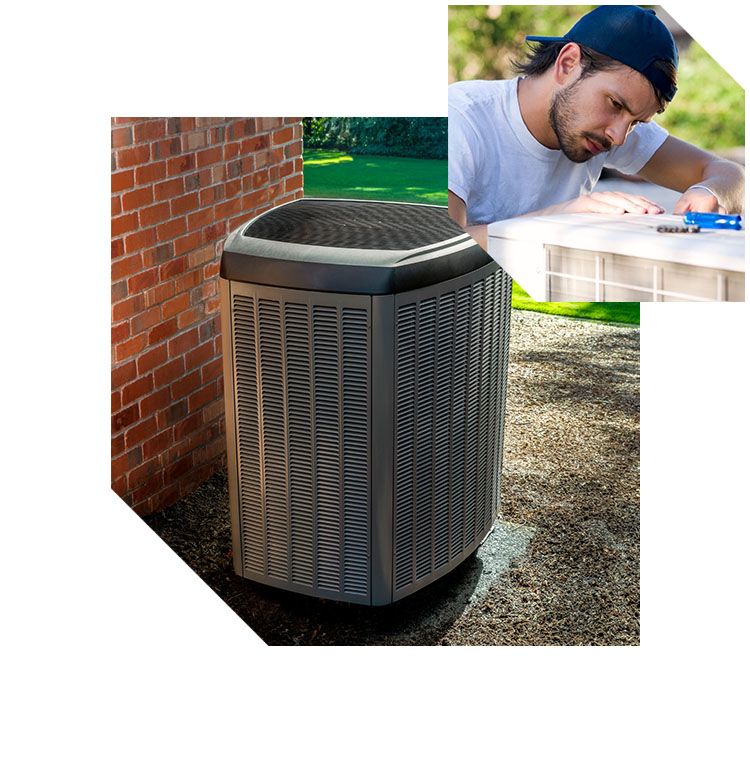
Build capacity of the heat pump sector
A critical aspect of accelerating heat pump adoption is creating a virtuous circle that drives supply and demand. Currently, interested homeowners struggle to find trained heat pump engineers.
Our research estimates that there are currently 3,000 trained heat pump engineers in the UK. This number needs to increase to at least 27,000 in the next six years – meaning training more new engineers every year than are currently in the whole industry. We’ve made a series of recommendations to government, training providers and businesses to help attract people into the low-carbon industry, improve training pathways and increase productivity in the sector. We’re now supporting new businesses that could help boost installer productivity as well as testing several ideas to increase training, recruitment and retention in the sector.



Help households use their existing heating systems more efficiently
The UK has over 29 million homes, of which around 24 million have gas boilers and 1.6 million have oil boilers. Even if the uptake of low-carbon heating skyrockets in the next decade, it’s likely that over 20 million homes will still be heated with gas or oil in 2030.
We can reduce carbon emissions in the short term by helping people run their existing heating systems more efficiently. In the context of high energy prices this can help cut costs and improve wellbeing. This will also pave the way for low-carbon heating by helping to show how many homes can be heated effectively at low temperatures and are therefore “heat pump ready”.
We’ve launched a public-facing campaign to help consumers save money, gas and carbon by reducing their combi boiler’s flow temperature. Although this is easy to do, most people haven’t been aware it’s possible or had the confidence to try it. We’ve carried out detailed testing in real-life conditions to help show what savings can be made; designed and rigorously tested an online tool that walks people through steps to adjust their own boiler; and built partnerships to spread the message. Our aim is for one million homes to turn down their boiler flow temperature.
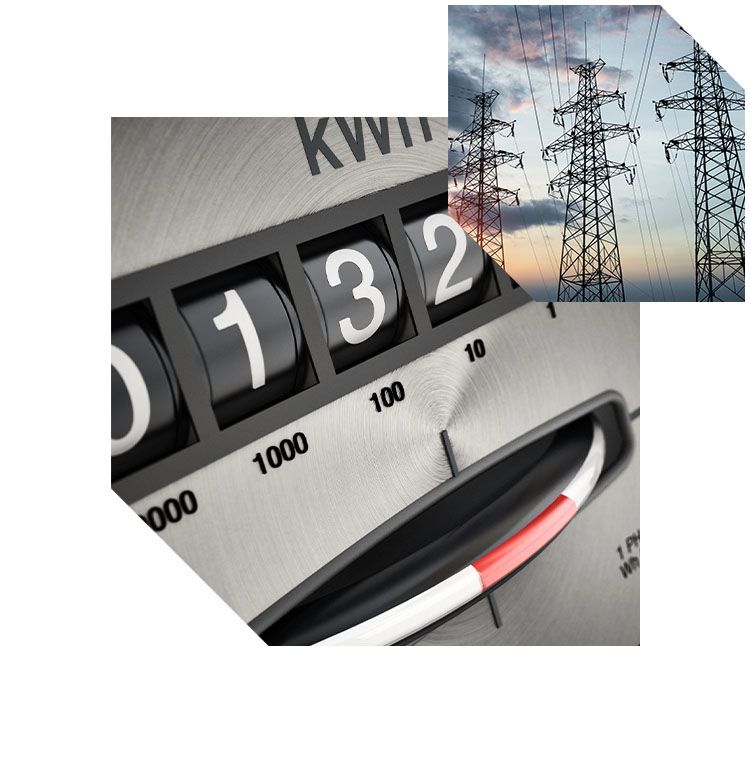
Shift electricity demand from peak times
As people use fewer fossil fuels – such as coal, oil and gas – and more renewable electricity, we will need to use energy more efficiently at home and shift usage away from peak times. Making this change will mean we can more easily meet demand from clean sources of energy, such as wind and solar power.
We will explore innovative technologies, products and services that make managing electricity use easier, for example by helping people to switch appliances on and off automatically, “pre-heat” their homes to avoid using heating systems in peak times, or to use and store renewable electricity when it’s plentiful.

Changing the way we heat our homes will benefit the planet. And cutting pollution from our homes is likely to be good for our economy too, improving efficiency, spurring innovation and creating demand for high-skilled jobs.
You can find out more and get updates on the sustainable future mission on our mission pages.